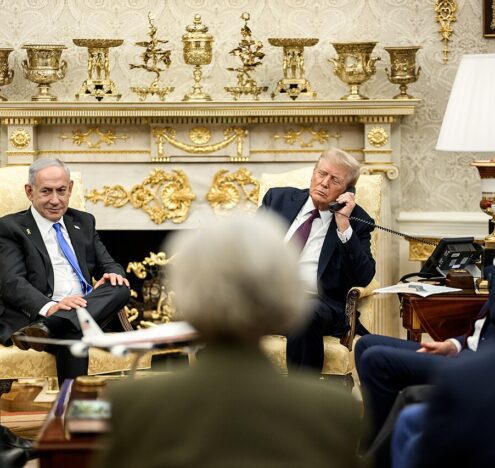Ursula K. LeGuin once said that, in hard times, we must be “realists of a larger reality.” This advice resonates with those of us who have been sounding alarm bells about US foreign policy.
For decades, bipartisan US foreign policy doctrinaires have refused to grapple with fundamental truths about the human toll of endless US wars, the discrimination inherent in resource extraction and pollution, and the economic ideologies that deepen poverty and marginalization. These are the consequences of a US foreign policy whose core function has been to secure US dominance globally — with the threat of US military attack as the ultimate enforcer. Meanwhile, advocates of a more progressive, just, and peaceful US foreign policy routinely face the criticism that our demands are too big, too radical and too unrealistic.
To press reset on all of that, we need more than a slate of replacement policies. We need to confront old assumptions underlying US foreign policymaking and start from fundamentally new ones. This Women’s History Month, let’s begin this process by fighting for an alternative, feminist foreign policy, one geared toward fundamentally reimagining the role of the United States in the world.
This month, the Biden-Harris Administration announced the formation of a White House Gender Policy Council, just as a new resolution on feminist foreign policy was introduced in Congress. This is an important start, as this focus on gender and feminism holds the potential to transform policy approaches — but only if we confront some vital questions that too often go unasked and ignored.
To start, patriarchal and gendered norms are all around us — but we are often unaware of them. They lie in the assumptions we make about what policies are realistic, efficient or effective, versus those that are considered unreasonable or weak. This is not only about socially-constructed power relations that subordinate or uplift people according to their gender. It’s also about a value system that divides everything — people, characteristics, and yes, policy options — into binary categories. Then, it privileges what we code as masculine, like aggression and individualism, and suppresses what we imagine as feminine, like care and collectivism. It warns us that we can only be strong through the threat or act of violence, and that compromise is dangerously weak. Carol Cohn’s groundbreaking work explores this dynamic at the crossroads of gender and security.
We witness these dynamics at play every day. We live with the assumption that war is a natural, default response to conflict, which makes other destructive policies like economic sanctions, that sicken and starve children, more palatable as a “peaceful” alternative. We see this thinking in the escalating rhetoric around “great power competition,” rooted in the hierarchical assumption that the United States must compete for the spot at the top against countries like China, with our survival depending on pushing others back. There’s little room left over for quaint notions of shared prosperity, cooperation or mutual reliance. That kind of thinking is for “wimps.”
Meanwhile, in foreign policy discussions, if feminism or women’s rights comes up at all, they often get siloed to specific categories, like gender-based violence or reproductive rights, which are essential concerns, but not the whole story. Or the conversation gets narrowly construed as a head-counting exercise to ensure diversity and gender parity in policymaking roles.
A feminist foreign policy demands an understanding of the centrality of gender justice, human rights and dismantling toxic norms of masculinity in every realm of foreign policy, from diplomacy and trade to defense and foreign aid.
Or, worse, women’s rights get conscripted into justifications for war and US aggression, as we’ve seen from Afghanistan to Libya to Iraq. A feminist foreign policy demands, instead, an understanding of the centrality of gender justice, human rights and dismantling toxic norms of masculinity in every realm of foreign policy, from diplomacy and trade to defense and foreign aid.
Otherwise, siloed or opportunistic definitions of feminist foreign policy result in little fundamental change because they provide cover for other policies that undermine feminist aims to proliferate. For example, a more holistic feminist policy lens would require an end to rampant Pentagon spending, armed attacks and nuclear proliferation, and a recognition that war often has the most devastating impacts on women, girls and communities at the margins, and diverts crucial resources away from combating the most pressing challenges of our times, like rising inequality and environmental devastation.
We must also confront the dominant racialized and gendered paradigms about what counts as policy expertise, and who is considered to have a perspective worth hearing. Feminist principles call for a fundamental rethinking of how we make policy and who sits at the table. Those living in or from the Global South, and in places on the receiving end of US imperialism, are rarely afforded a platform to shape decision making, and the voices of women and LGBTIQ+ people in those local communities are even more sidelined. US policymaking is worse off for it.
For instance, to achieve a US-Yemen policy that can end bloodshed and foster lasting peace, US policymakers need to hear from people like Muna Luqman, whose organization Food4Humanity has not only built girls’ schools, delivered food aid and rebuilt water systems amid Yemen’s war, but has helped to nurture a network of women peacebuilders with grassroots ties to and deep-rooted trust in communities — a vital asset to the success of any peace effort. Studies have revealed that centering women’s meaningful participation in peace processes results in agreements that are 35% more likely to last at least 15 years. Peace organizers and rights activists like Stella Duque and Charo Mina-Rojas in Colombia, Yanar Mohammed in Iraq, and so many others have the vital expertise that can shape a US foreign policy for peace.
Also left out of foreign policy discussions are the voices of domestic social movements, such as those hard at work confronting environmental injustice, police violence and many other crises that bear deep connections with foreign policy concerns. A feminist approach to foreign policy must prioritize collective solutions to common threats, like endless wars at home and abroad, and democratize foreign policy debates by bringing in new perspectives, as envisioned by a new Feminist Peace Initiative spearheaded by MADRE, the Grassroots Global Justice Alliance and Women Cross DMZ.
To be clear, this requirement of inclusion goes beyond just having more gender diversity around the table. As much as basic equity and effectiveness demand inclusion, there are dangers in over-reliance on that singular lens. This is about a fundamental reorientation of values.
One method to achieve this is gender analysis, which reviews policies to reveal their different or disproportionate impact on people of different genders. Black feminist scholars like Kimberlé Crenshaw innovated the concept of intersectionality to grasp the ways that all forms of identity (such as race, disability, class, sexuality, and more) interact to produce different outcomes and perspectives. This analysis then allows us to produce effective policy strategies to navigate those gender impacts and confront potential harms.
Finally, a feminist foreign policy would also uplift and resource practical, local solutions, developed by grassroots women. In the realm of climate response, for instance, this can mean learning from local women’s adaptation strategies — from protecting wetlands in Jamaica to pooling their knowledge as subsistence farmers in Sudan — that offer a blueprint for broader U.S. and international policymaking.
There is no feminist foreign policy that can co-exist with our patriarchal, militarized status quo. If we truly succeed in placing feminist values at the heart of US foreign policy, what grows from that will be unlike anything we’ve seen before. A more peaceful and just future depends on it.
Yifat Susskind, MADRE Executive Director, partners with women’s human rights activists from Latin America, the Middle East, Asia and Africa to create programs in their communities that meet urgent needs and create lasting change. A lifelong promoter of human rights, Yifat leads MADRE’s combined strategy of community-based partnerships and international human rights advocacy.
Diana Duarte, Director of Policy and Strategic Engagement at MADRE, leads their Feminist Policy Jumpstart initiative, partnering with grassroots women worldwide to bring their perspectives and analysis to shape progressive US policymaking.




















